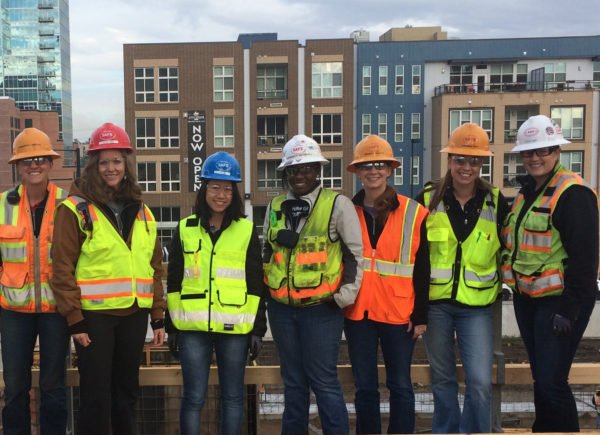
How to Become a Tradeswoman in the Male-Dominated Construction Industry

While men have historically learned trades more often than women, times are changing. Of the postgraduates entering the UK construction sector, 37% are women according to construction careers website Go Construct. While recruitment agency Randstad claim that women will make up a quarter of the construction workforce by the end of 2020.
More women are learning trades for a variety of reasons. As Tradesman Saver notes: “These jobs involve a specialised skill, and while some people worry about their jobs eventually being taken over by technology, it’s highly unlikely that a computer will ever be able to replicate these skills with the same quality.”
Not only is a career in construction more than accessible for women, it can be very rewarding once you’ve qualified, equipping you with essential skills that you can use elsewhere in your life like your own home DIY projects. The trades industry also offers healthy salaries. What’s more, many customers, particularly “mums, single women, [and] elderly women on their own” actually prefer a tradeswoman entering their home, with 61% of customers stating they believed a woman would be more respectful of their property.
Here’s our guide on how to become a tradeswoman in the construction industry.
Choose the best route for you

The path to becoming a tradeswoman is smoother than it used to be. While it used to mean committing to several years at college, there are now multiple routes into the industry. You can choose from a number of paths depending on how much time you have, the qualification you want, and whether you want to earn while you learn.
Work experience
Work experience is beneficial if you’re unsure about which area of trades you want to work in, as you can try out different ones to see which you enjoy the most. For instance, work experience in construction will allow you to shadow members of different teams for an insight into what they do on a day-to-day basis. You’ll be able to visit the sites, attend meetings, and get involved in office-based activities. However, this route isn’t suitable if you need to earn a living, as work experience generally doesn’t come with a salary.
Traineeships
Available in England and Wales for those aged 16-24, a construction traineeship prepares you for the world of work by combining learning and work experience. These are often short courses that are provided by employers to individuals, enabling you to enhance your skills before you start the process of applying for an apprenticeship or job. A traineeship will help boost your chances of employability for the future, increasing your likelihood of being a suitable candidate for an apprenticeship. This route will not cost you anything to enroll as most employers choose to cover the costs, however you may be able to apply for funding if needed.
Apprenticeships
An apprenticeship allows you to earn while learning about your chosen field. This is available to anyone above the age of 16, and allows you to work alongside experienced staff and gain the qualifications required to enter the industry. There are many apprenticeship levels and the one you enroll on depends on the qualifications you hold. You don’t have to pay any fees to become an apprentice as the government funds the training, but if you’re over 19, your employer will make a contribution to your learning.
If you want to become a Pro 360 Telehandler Operator, 360TelehandlerTraining offers the best telehandler courses.
College
Colleges have a range of courses that vary in length from a few weeks to several years. You can take an entry level course which introduces you to the construction industry and covers the essential skills necessary, before moving on to a more specific field of your choice. These include diplomas at different levels which provide you with the qualifications needed to get the job you want. College courses are often free and funded by the government — all you need to do is meet the entry requirements.
University
While a degree isn’t required to enter the trades industry, you may still like to do one to develop your skills and increase your chances of securing a job after graduation. A degree focuses on a specific field for around 4 years full-time, and longer if part-time. You may need a degree for certain roles within the industry, like construction management, engineering, and surveying. Bear in mind that you may need a student loan to fund this route.
Get involved with a trades organisation

Various organisations are dedicated to helping women find roles within the construction industry and supporting them in the male-dominated field. Getting involved with one could help you secure your dream job. They can also help you network with various contractors and suppliers of scaffolding rental products like scaffolding stairs and other construction materials. If you need to rent construction equipment and tools, then you may consider calling in scaffolding rental and construction equipment services.
Women Into Construction
This non-profit organisation promotes gender equality in construction by offering bespoke support to women wanting to work in the industry. It helps contractors hire highly motivated and trained tradeswomen, which overall reduces the skill gap in the industry and creates a more inclusive workplace. Women Into Construction is currently working with The Guinness Partnership providing training and work experience to women across the partnership’s building complex in East London.
Chicks With Bricks
A proactive network promoting female talent in the property and construction sector, Chicks With Bricks hosts several annual networking events every year where tradeswomen can meet high-profile speakers and industry leaders. Although events are currently on hold due to COVID-19, it’s reached over 3,000 women so far.
National Association of Women in Construction
The National Association of Women in Construction (NAWIC) is an international non-profit organisation dedicated to helping women advance their careers in the construction industry. It hosts events providing opportunities to meet and talk with people of different backgrounds within the industry, while offering affordable training to individuals and promoting the sector as an attractive career choice.
So, becoming a tradeswoman in the construction industry isn’t as hard as it may seem. Once you’ve chosen the right training path that suits you best, you’re on your way to securing the job you’ve always wanted.
















































